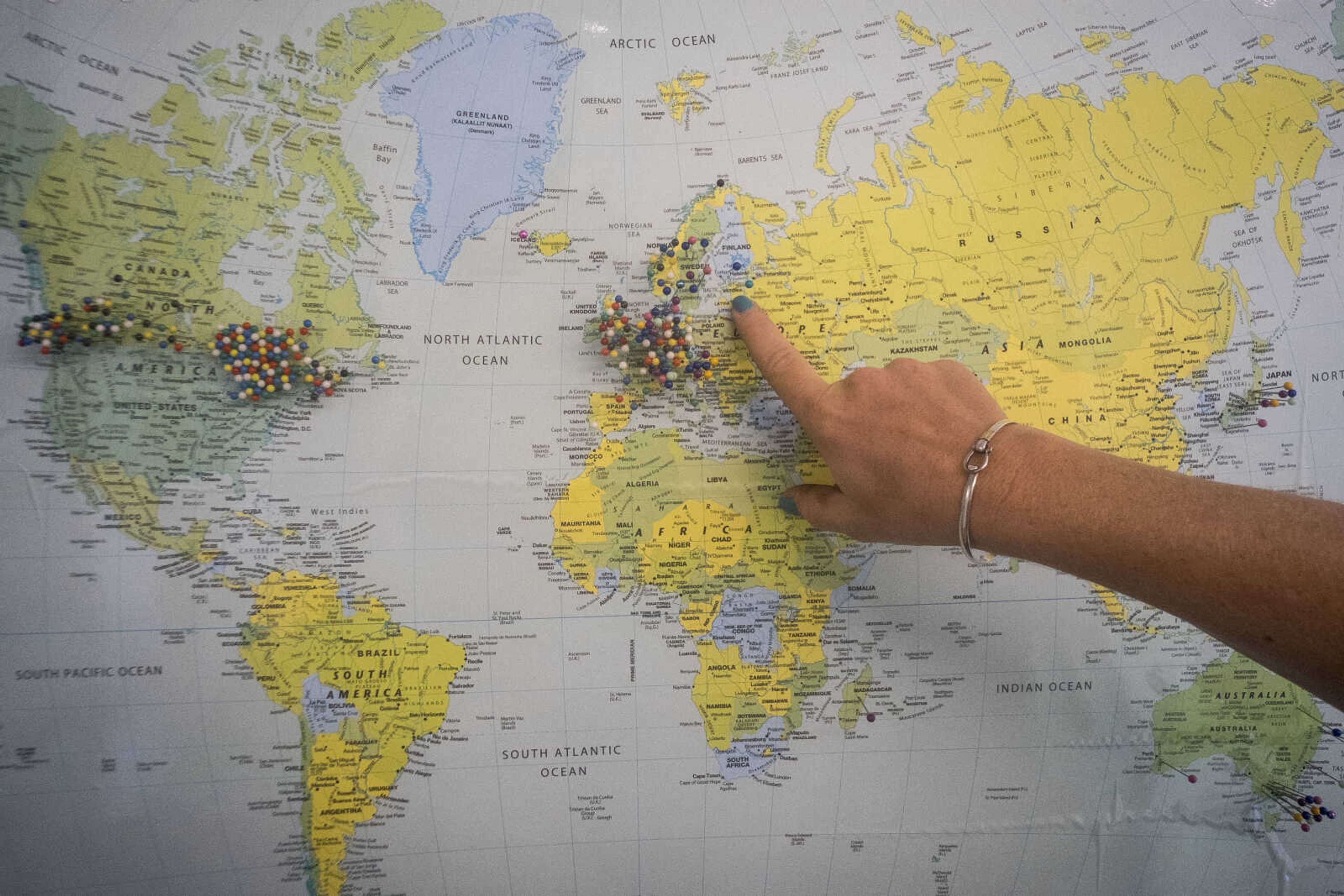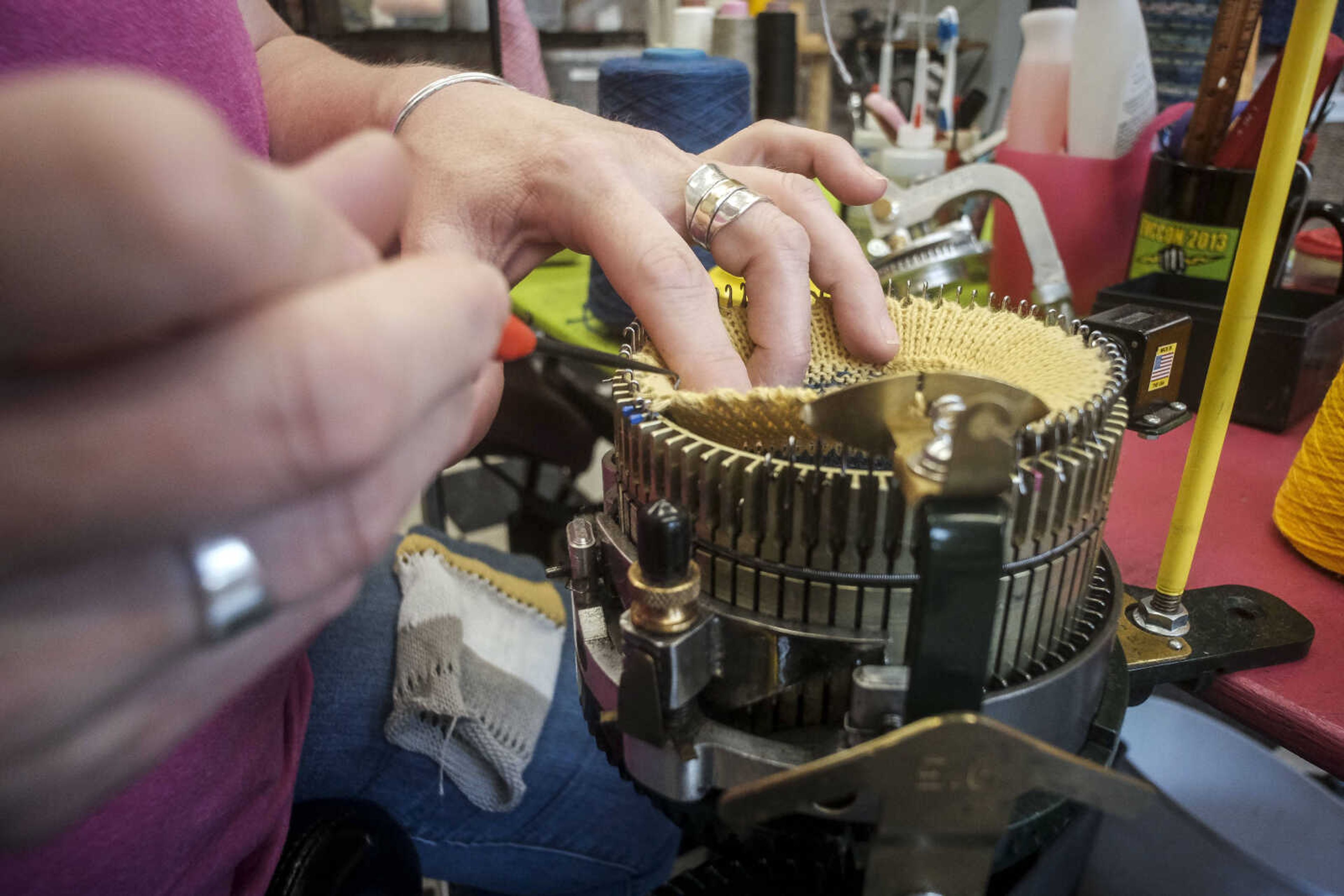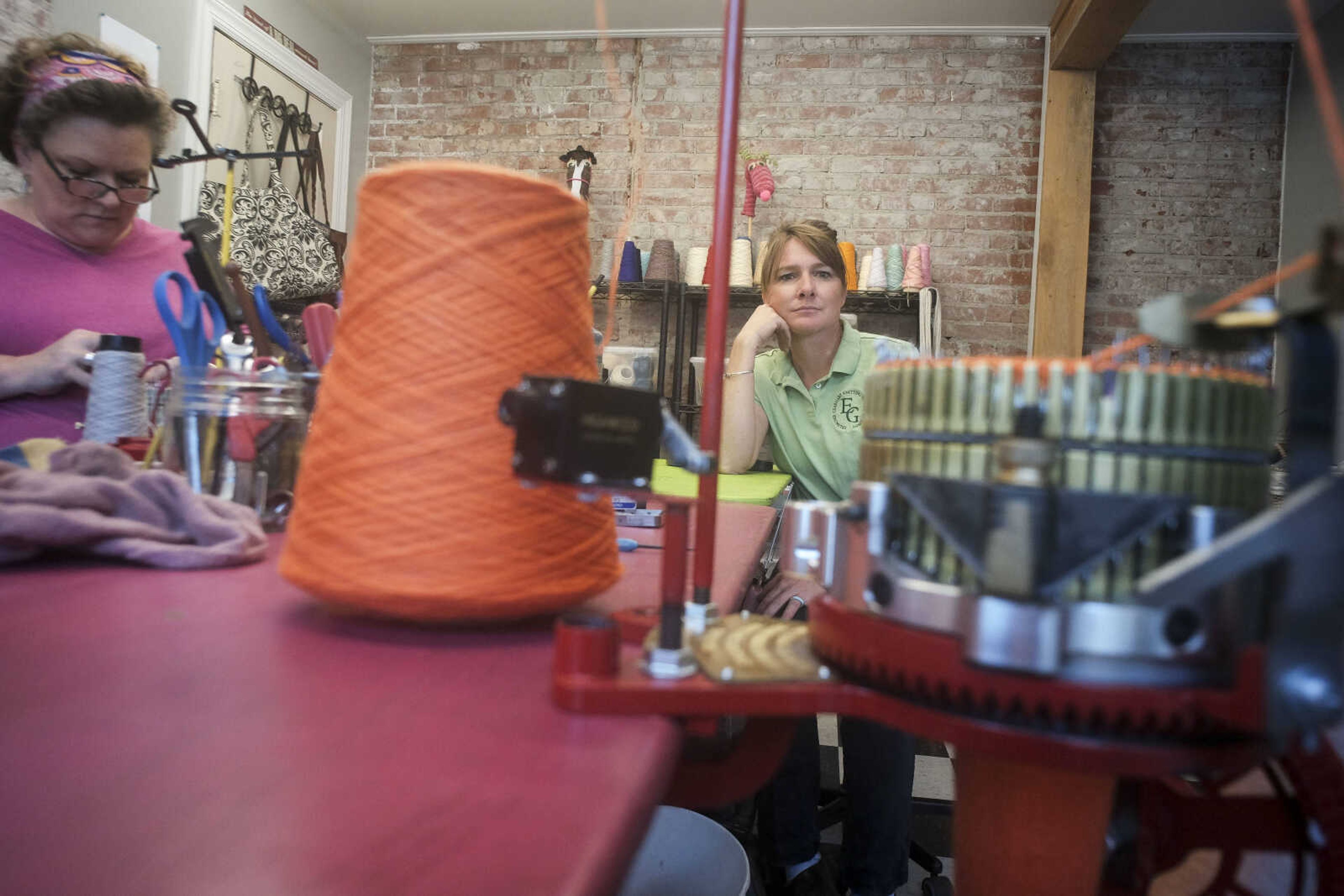Born to knit: Erlbacher knitting machines make socks around the world
There are a pair of maps on the wall in the front office at Erlbacher Gear & Machine Works in Cape Girardeau. One is a map of the United States. The other a map of the world. Both are adorned with hundreds of blue pushpins. Grayson Erlbacher smiles as she looks at the map, realizing each pin -- placed in virtually every region of the maps -- represents someplace where her father's "crazy idea" led to the sale of a unique device made in the Erlbacher machine shop...
There are a pair of maps on the wall in the front office at Erlbacher Gear & Machine Works in Cape Girardeau. One is a map of the United States. The other a map of the world.
Both are adorned with hundreds of blue pushpins.
Grayson Erlbacher smiles as she looks at the map, realizing each pin -- placed in virtually every region of the maps -- represents someplace where her father's "crazy idea" led to the sale of a unique device made in the Erlbacher machine shop.

Her father was David "Pee Wee" Erlbacher, and the company on Good Hope Street that bore his name was, and continues to be, known for fabricating massive gears for industrial customers and heavy equipment operators. But it was about 10 years ago when Pee Wee decided to fabricate something quite different -- a sock knitting machine.
Both Grayson and her sister, Jamie Mayfield, were working with their father back then when he brought the idea to them after seeing an antique knitting machine from the late 1800s. "He came to us and said, 'I saw this machine, and you turn this handle, and it spits out a sock,'" Grayson recalls. "And we were like, 'That's the dumbest thing we ever heard!'"
Several companies made sock-knitting devices more than a century ago like the one Pee Wee saw. One of the most popular was the Gearhart Knitting Machine, which was made from the late 1880s until the mid-1920s. "We found one on eBay and bought it," Grayson remembers. "It was a Gearhart. We had done some research, and the reason we picked the Gearhart is because it looked like the easiest machine to reproduce."

It took more than a year and $35,000 to "reverse engineer" the Gearhart unit. "In the meantime, we found people who knew how to knit and were antique restorers. One of them told us, 'If you make these, you're gonna sell them,' and I thought, 'Well, we better sell $35,000 worth,' because that's how much we took out of our operating capital," she says. She admits she was skeptical as they recreated -- and in some ways improved -- the antique knitter, thanks to improved materials and manufacturing technologies that weren't available a century ago.
"Everything we made back then was big, and the parts on the knitting machine were small, so we had to learn how to tool down," Grayson explains. "It's a huge contradiction in size alone, and it takes more people to make the knitters than our other stuff because there are 72 machined parts in them."
Thanks to word of mouth, the newly-created knitting machine division of Erlbacher Gear & Machine Works sold 35 devices even before the first prototype was perfected, and in 2010, the company hosted an open house to introduce the new version of the old technology.
"We didn't think 70 people would come here, but they came, and we realized we were on to something," Grayson says.
"At first, we thought we'd just sell them to people who had an interest in antique knitting machines," she remembers. "We thought we'd sell, I don't know, maybe 300, but then people started taking them to their knitting clubs, and knitting club people would say, 'I need one of those,' and it just kinda spread like wildfire."
The Erlbachers began marketing the knitting machine through the Internet and social media. "Initially, we made people put a $100 deposit down to make sure they were serious because we thought they weren't really going to spend $2,000 on a sock knitting machine," Grayson says. "But yes, they were ... and they might buy two!"
They also discovered it wasn't just "little old ladies" who were buying the machine. "It was young people, too," she says. "Early on, we sold a machine to a 13-year-old boy whose mom said he liked to knit. He got the machine, and it was like a duck to water. He began making products and selling them at a farmer's market in Oregon."
And he wasn't the only one. Customers have discovered they can create and often sell all kinds of knitted crafts with the machine -- from scarves, gloves and sock caps, to ornaments, yarn dolls and golf club head covers. Customers often send Grayson and the Erlbacher staff photos of their projects.
"With our corporate customers, they email us a purchase order, we make a part, and they send us money. That's it. If they call us, they're usually mad about something," she says. "But these people call and say, 'Hey, I made my first sock!'"
Every April for the past decade, Erlbacher Gear & Machine Works invites customers from across the country and around the world to Cape Girardeau for a "Crank In" at which they learn new and innovative ways to use their knitting machines. The event also gives knitters an opportunity to show off their creations and share tips and ideas with others. "The skill level of people who are our customers is absolutely incredible," Grayson says. The annual gatherings also give customers a chance to meet Erlbacher machinists and see how the knitting machines are made.
Although Pee Wee Erlbacher died in 2015 and Jamie Mayfield has left the company -- though she still helps tutor people on how to use the knitting machine -- the legacy of the Erlbacher Knitting Machine lives on. Thousands of knitters have been sold in virtually every corner of the globe. "We haven't sold any in Antarctica yet, but we're working on it," Grayson laughs.
"We could have never dreamed the knitting machines would become such a big part of our business," she says, adding that knitting machine sales seem unaffected by economic ups and downs.
"The recession of 2008 was bad for everybody, and we were down to four-day work weeks. But my dad had the genius thought that knitting machines could get us through a time like that. He was way forward-thinking about how to diversify, so the joke was on me," Grayson says with a smile. "I'm the one who made fun of him!"
Connect with the Southeast Missourian Newsroom:
For corrections to this story or other insights for the editor, click here. To submit a letter to the editor, click here. To learn about the Southeast Missourian’s AI Policy, click here.







